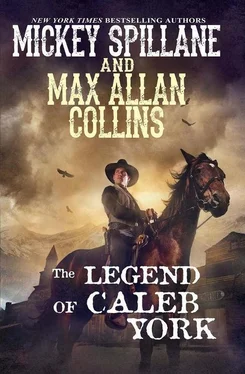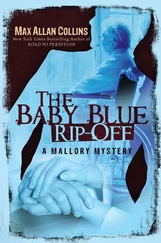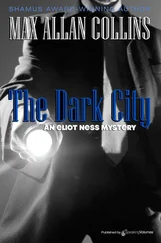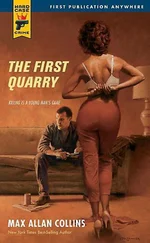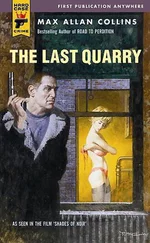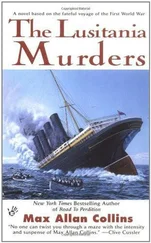“No wonder we couldn’t see them,” the stranger said.
Whit, now riding alongside his adversary of minutes ago, said, “I want to get a look at those carcasses.”
“You want help?”
“No. No need to put anybody else at risk.”
The foreman dismounted, withdrew a folded-up shovel from a saddlebag, and stepped down into the draw, navigating the steepness of the slope with some difficulty, but managing.
Reaching the new, uneven pile of earth that filled the floor of the draw, Whit used the unfolded shovel to stroke away dirt from several suspicious lumps and expose more dead cows. He bent to each one, making an inspection, using gloved hands to help him see what he needed to. Then he stood, surveyed the grim scene, and made his way back up the steep, treacherous slope.
The foreman lifted his eyebrows and said to Willa, “Infected, all right. And they all wear Gauge’s Circle G brand.”
Rancher Gerrity said to no one in particular, “You know what that means — we gotta destroy every damn head of the sheriff’s herd.”
Whit, refolding and putting his shovel away, glanced back and said, “There’s hardly a cowhand on that spread of his who ain’t also a gunfighter, mind. He’ll be ready to fight.”
“So will we,” Gerrity said.
“If there’s time,” the stranger said.
Everyone looked at him.
“Gauge might be driving them into Las Vegas right now,” the stranger explained. “He can meet with the buyers today and give them his numbers and make a deal.”
Whit, frowning, said, “And once he’s sold ’em and they’re in pens mixed with cows from other herds, Gauge is in the clear.”
Willa wiped sweat from her brow and said, “The first batch of buyers is due into Trinidad on the stage this afternoon.”
The stranger asked, “How soon?”
She shrugged. “Three, four hours.”
He thought about that. “But first they change horses at the Brentwood Junction relay station, right?”
“That’s right.”
Eyes narrowed, he said, “If I can reach those buyers there, before they hit town, I can pass the word about the infected stock. Those businessmen won’t take a chance on paying for infected steers.”
Gerrity spat chaw and said, “You don’t have much time, mister.”
“No. And I better not waste it here.” He nodded to Whit, who nodded respectfully back.
Then the stranger swung his horse around, and as he passed by Willa, she raised a hand for him to stop.
He pulled up on the reins.
“Thank you,” she said simply, “and good luck.”
Her back to the others, with only him seeing, she kissed her palm and held her hand out to him. He took the hand, held it briefly, his eyes holding hers for several long moments.
Then he rode off.
They watered their horses at a nearby stream in a stand of cottonwood and made their plans.
With everyone circled around, Whit said, “We’d better get to riding, too. If Gauge’s bunch makes it through the pass with that herd of theirs, they’ll post a handful of men and hold us off long enough to have those beeves well on their way to the railhead.”
His hat off, scratching at his white temple, Mathis said, “Leave us handle that, Whit.”
Whit frowned. “What?”
The rancher put a hand on the Cullen foreman’s shoulder. “Son, you and Willa got other fish to fry.”
“No... we’re all in this together.”
Gerrity came up and put a hand on the foreman’s other shoulder. “We already had a powwow and you been outvoted. You take half these men and see if you can find them Bar-O cattle.”
“Listen,” Willa said, shaking her head, “this is bigger than just the Bar-O—”
“No,” Mathis said, shaking his head back at her, “you listen, young lady. In a way, all this whole damn mess is our doin’, smaller ranchers and townsfolk alike, for lettin’ Gauge get as far as he got. Independence-minded sorts sometimes don’t remember that when their neighbor is in trouble, trouble’s about to show up on your own doorstep, too.”
“I know,” she said, “but—”
“ ‘But’ nothin’,” Gerrity said. “If we succeed, we’re about to go off and destroy Gauge’s cattle. And if our stock turns out to be infected, too, we’ll have to get rid of all them. That means we may be needin’ starter cattle for next year. It’s George Cullen we’ll turn to. So you’ll be doin’ us a favor, gettin’ that healthy herd back in the right hands.”
The other rancher said, “Miss Cullen, best you go home and stay at your father’s side. Take a few men with you.”
Gerrity was nodding. “No tellin’ what Gauge might pull at this point.”
“No,” she insisted, shaking her head, ponytail swinging. “Papa’s not alone there, and you can use another experienced hand.”
“I just hope,” Mathis sighed, “that we ain’t too late.”
Frowning, Willa asked, “What do you mean?”
“I mean, Gauge may be ahead of us. He may’ve figured that we’d try meetin’ up with the buyers at the relay station, and’s already sent somebody out there to stop us.”
Gerrity said, “And here we sit, with all our hopes pinned on one duded-up stranger.”
Whit said, “It’s a safe-enough bet.”
All heads turned his way.
“I was dead wrong about him,” the foreman said. “He’ll do right by us or die tryin’. Meantime, the rest of us need to help you destroy that infected herd.”
Shaking his head firmly, Mathis said, “Face it, Whit — you’re outnumbered. You’re gonna do it our way. Half these men are going with you and get back those healthy cows.”
There was no more arguing it. Whit did as he’d been told, and soon they were watching half of the men ride off in a dust cloud, hooves pounding.
Then Willa, Whit, and the rest rode off in the other direction, just as hard.
Tulley’s morning had been eventful.
He had spent several hours of it under the boardwalk, curled up in its coolness with the bottle of rotgut he’d bought at the Victory. It had cost him a whole dollar out of the five he’d been given, highway robbery, but seemed worth it at the time.
Only thing was, damn it, that fool conscience of his had come kicking him in the hindquarters like a mule.
And speaking of mules, early this morning, the stranger had give him all that money on the condition that Tulley buy back his mule Gert from Hitchens at the livery stable. That was what come of running at the mouth around a new acquaintance. Drunks had a terrible bad habit of telling people their life stories.
When he first come to town, Tulley was sober for a spell, and got to thinking that the life of a prospector hadn’t been so bad. That had been his vocation before taking on the job of (as the stranger put it) town character. It beat sweeping out stables and doing odd jobs and sleeping in alleyways, didn’t it?
Tulley had prospected for two whole days in the foothills before he remembered why he’d stopped doing it in the first place. Back in town, he resold Gert to Hitchens for three dollars, drank it up in two days, and Gert became just another female (well, sort of female) memory in the pages of an increasingly hazy past history.
Trouble with Gert was, she wasn’t so hazy a memory, living in the stable as she did, where Tulley bedded down much of the time. Having that damn mule around served as a nagging reminder of his failings.
This morning, not that long after dawn, the stranger had given him that five dollars to buy Gert back and ride out to the Cullen spread to offer his services as a sort of guide. Nobody around Trinidad knew those foothills better than old Tulley.
The desert rat had agreed, shaking hands with the stranger, who had ridden off, after which Tulley waited till the saloon opened at ten and bought his bottle. Crazy part was, he never uncapped the thing. He lay in the coolness under the boardwalk with the bottle in one hand and the rest of them dollars in the other.
Читать дальше
